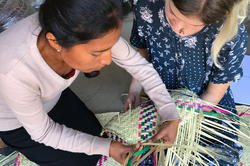Students finish the fall semester by sharing their final projects with visiting experts from around the world.
Broadening the Design Canon

RISD Architecture students Namrata Dhore BArch 21, Sofie Kusaba BArch 21 and Christina Truwit MArch 21 grew tired of hearing the same names—Corbusier, Wright, Mies—and seeing the same Eurocentric references in crit after crit. They found the canon on which the majority of architectural pedagogy relies—at RISD and elsewhere—to be exclusionary in nature.
“The ‘ethos’ that Western educational institutions have created for architecture is very limited in its understanding,” says Dhore, “and perpetuates capitalist, hegemonic ideologies.”

The three women are working to broaden the canon in their chosen field through Project Archive, an open-sourced, online index of “precedents” or architecture examples that draws on non-Western forms. The main goal is to bring attention to structures that have been largely invisible—many of them with roots in the Global South—and to provide resources for architecture professors and students. “Think of it as an alternative to the ArchDaily,” says Kusaba, referring to the online publication professional architects use to keep abreast of the latest industry news.
“There’s a certain clean-lined, rectilinear aesthetic that dominates every discussion,” she adds. Furthermore, she insists, the focus should not be on how a structure looks but on how it functions. Since there are multiple modes of living around the world, enforcing modern architectural standards everywhere may not meet every community’s needs.

As an example, Dhore references the Indigenous longhouse, an open space where an extended family can live and work communally. Because of the structure’s “awkward butt joints” and thatched roof, she says, many modern architects consider it “vernacular” and not worth discussing.
“The ‘ethos’ that Western educational institutions have created for architecture is very limited in its understanding and perpetuates capitalist, hegemonic ideologies.”
“We’re often taught to look at architecture as this object plopped onto clear land, where nothing already exists,” Dhore says. “For the past couple of years, we’ve been conducting research to promote the idea that architecture is in fact a result of the context in which it’s built, the people and the culture.”
The international trio will present their archive (virtually) in late March at the Association of Collegiate Schools of Architecture’s annual conference, and they’re also putting together an April symposium at RISD (titled Towards a Practice of Refusal) that’s open to the entire community. “We heard about the ACSA conference through our department head, Amy Kulper, who has been incredibly supportive,” Truwit notes.

They’re working with RISD alums and other current students to promote the project, including Uthman Olowa MArch 23, who is creating audio components for their website Bryson Lee 22 GD and Hawa Abbajebel 23 SC, who are focusing on social media promotion; and Graphic Design major Soleil Singh 21 GD, who is helping with zines and posters. “Each zine showcases a precedent that best represents its category in the archive,” Truwit explains.
“There’s a certain clean-lined, rectilinear aesthetic that dominates every discussion.”
They intend to continue the work after completing their degrees at RISD and are co-authoring a related book, which will be published later this year. “We have already received great support from Soul Brown, RISD Research and mentors from the Architecture, Graphic Design and Theory + History of Art + Design departments,” says Truwit, “and we’re currently applying for grants for the coming year.”
As the Project Archive intro explains, its creators “strive to guide students to incorporate works outside the Western canon into their own design practices in the hope that they will eventually (and respectfully) be aggregated into the wider archive of precedents.”
—Simone Solondz
March 11, 2021


